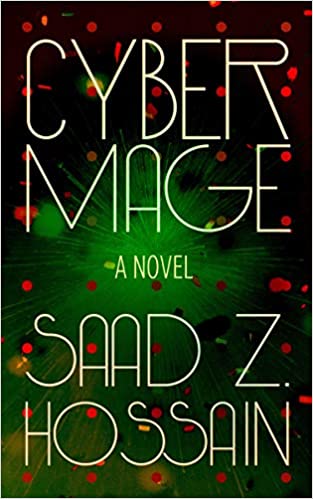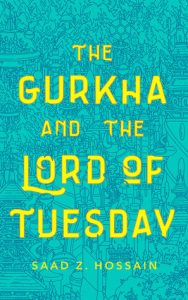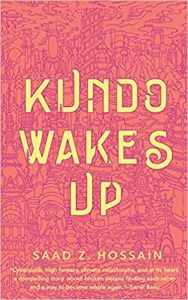 Cyber Mage by Saad Hossain
Cyber Mage by Saad Hossain Format: eARC
Source: supplied by publisher via Edelweiss
Formats available: paperback, ebook
Genres: climate fiction, cyberpunk, post apocalyptic, science fiction
Pages: 288
Published by The Unnamed Press on December 7, 2021
Purchasing Info: Author's Website, Publisher's Website, Amazon, Barnes & Noble, Kobo, Bookshop.org
Goodreads
Welcome to Dhaka, Bangladesh in 2089. A city notorious for its extreme population density has found an unexpected way to not just survive a global climate apocalypse, but thrive: pump enough biological nanotech into the neighborhood and all of the bodies together form a self-sustaining, and even temperate, microclimate. Of course, this means that millions of humans have to stay put in order to maintain a livable temperature, and people are getting restless. All of the nanotech has also led to some surprises: certain people no longer need food or water while others can live without functioning organs.
So the mercenary Djibrel has to carry a machete wherever he goes. Only a swift beheading can ensure the job gets done anymore. Djibrel navigates the crowded streets, humans teeming with genetic mutations, looking for answers about what happened to the Djinn, a magical super race of genies who seem to have disappeared, or merged, with humans for survival. What Djibrel doesn't know is that his every move is being tracked by the infamous Cyber Mage—better known to his parents as Murzak, a privileged snarky teenager who regularly works for a Russian crime syndicate with a band of elite hackers, like his best friend ReGi, who resides in North Africa's FEZ (Free Economic Zone). Respected and feared online, Murzak is about to embark on one of his biggest challenges: attending high school IRL. But when he discovers a brand new type of AI, operating on a dark web from the abandoned Kingdom of Bahrain that he thought was just an urban myth, Murzak and Djibrel will have to face the unimaginable in an already inconceivable world.
In this laugh-out-loud-funny and totally original new novel, Saad Z. Hossain continues his signature genre mashup of SF and fantasy, challenging and subverting everything previously imagined about our future and climate change. A scathing critique of corporate greed, Hossain shows us how to think beyond the naïve ideas of preening moguls like Jeff Bezos and Elon Musk.
My Review:
 I wanted to read this book because I absolutely loved The Gurkha and the Lord of Tuesday and hoped there would be more like that. Which, as it turns out, there are – and more than I originally thought. Which is definitely good news!
I wanted to read this book because I absolutely loved The Gurkha and the Lord of Tuesday and hoped there would be more like that. Which, as it turns out, there are – and more than I originally thought. Which is definitely good news!
In fact, having read Gurkha, this and Kundo Wakes Up (to be reviewed closer to its March pub. date), after looking at the blurbs for the author’s other work, I’m starting to think that they are all set in the same dystopian, post-apocalyptic future. And what a fascinating world it is.
This is a future where the world has descended into dystopia as a result of an ecological rather than an economic catastrophe. This particular view of this future is also a bit of a twist on Ready Player One – but it’s a twist where Wade Watts is one of the privileged few instead of the disadvantaged many, pursuing a quest fueled by artificial intelligence and unearned privilege instead of desperation. In a world where the Virtuality is run on greed instead of nostalgia.
And this is also a coming of age story, because the Cyber Mage who is both admired and feared as one of the greatest hackers ever in the Virtuality is a spoiled, overprivileged, lovesick teenage boy who has decided to leave his ergonomically designed and engineered chair in his parents’ apartment in order to chase after the girl of his dreams. The girl he’s been cyberstalking like, well, a lovesick teenage boy.
He’s going to enroll himself in high school – even though he’s a genius who has already passed all the classes – in order to meet his dreamgirl in person and impress her. Even if he honestly doesn’t know what to do after that.
It turns out that what he’s going to do after that is defend the entire school from an invasion. And grow up.
 Escape Rating A: There are a couple of things about this story, and the other books I’ve read by this author, that have absolutely made me fall in love with his work. One is the extremely high snark quotient. It seems like most of his characters are possessed of a very smart mouth. In Cyber Mage, the only ones who don’t are the parents of Murzak, the Cyber Mage himself. I’m not entirely sure that their refusal to acknowledge so many of his ultimatums isn’t actually a form of passive-aggressive snark.
Escape Rating A: There are a couple of things about this story, and the other books I’ve read by this author, that have absolutely made me fall in love with his work. One is the extremely high snark quotient. It seems like most of his characters are possessed of a very smart mouth. In Cyber Mage, the only ones who don’t are the parents of Murzak, the Cyber Mage himself. I’m not entirely sure that their refusal to acknowledge so many of his ultimatums isn’t actually a form of passive-aggressive snark.
The other thing, and the bigger one over the course of this story and his other work so far, are the constant and continuing reversals of both expectation and fortune.
Murzak himself is a prime example. He is, probably, as smart as he thinks he is. But it’s all book-smart. His ability to apply all those smarts to real life is a bit lacking. Putting it another way, he’s simply naïve, not a surprise as he’s still of an age to attend high school. Fitting in is another matter entirely. But he doesn’t have the knowledge of the way the world – and the people in it – really work to keep his mouth from writing checks that the rest of him can’t really cash because he doesn’t yet understand what he’s working towards. He only thinks he does.
If Murzak were an adult with his attitude, he’d be insufferable. As a teenager, he’s a bit of an accident and an attitude waiting to happen. That he’s lying all around – to himself, to his fellow students, to the extremely dangerous people who employ him – that accident is definitely barreling towards him at breakneck speed.
So a huge part of this story is him stepping up to the plate, getting involved in how the world really works, and discovering that adulting is no fun at all but that it’s a job that has to be done. And that he’s the best man to do at least some of it.
But the other part of this story that runs counter to expectations – at least unless one has read some of the author’s previous work – is the way that the effects of the ecological disaster have been handled.
A lot of post-apocalyptic stories show desolate, deadly landscapes where the remaining human population ekes out a marginal existence on a world that is killing them, whether slowly or quickly.
This post-apocalypse, utilizing a still heavily populated Southeast Asian setting, turns the large population into a climate-recovery asset, implanted with nanobots that monitor their every move and inject life-giving climate repair and pollution cleanup with every breath. All controlled by huge, advanced artificial intelligences which keep the cities mostly balanced while still privileging the wealthy and keeping the majority of the population on a universal basic income that keeps them alive, disaffected, and bored. Which doesn’t matter, as long as their nanobots help clean the air and keep them entertained enough to go on living.
But the balance is so complex that the A.I.s are the ones really running everything. And they have minds of their own. Literally. Which puts an entirely new player on the board who has more oversight and control than even the most paranoid doomsayers ever imagined.
And in the midst of all this technology, there really are djinn, and they really do have an agenda of their own. An agenda – and agents to carry it out – that neither the privileged humans or the pampering A.I.s ever put into their calculations of who – or what – is truly in control.
















